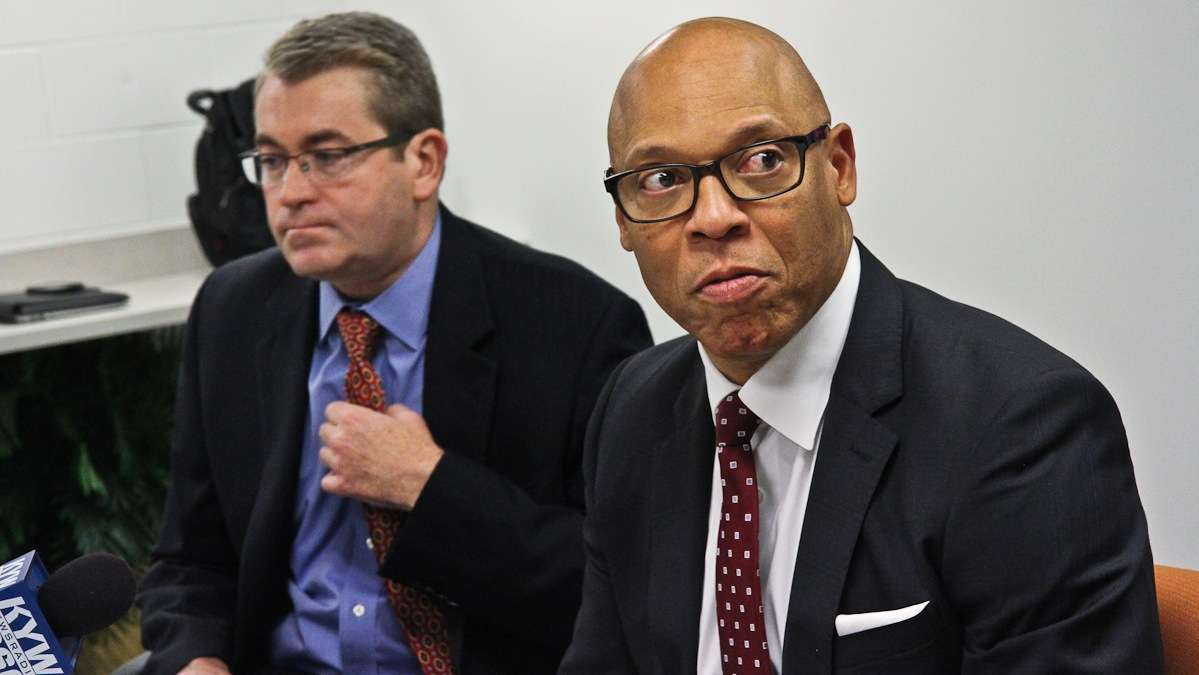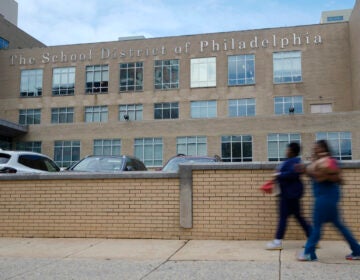Pa. lawmaker wants to put chronically underperforming schools under state control
Listen
Philadelphia Superintendent William Hite (right) and Philadelphia School Reform Commission member Bill Green. (Kimberly Paynter/WHYY)
There’s a general rule in Harrisburg: Republican leaders don’t authorize more education spending without demanding stricter accountability measures.
Case in point, on the heels of Gov. Tom Wolf’s proposal to dramatically increase state aid for public schools, state Sen. Lloyd Smucker (R-Lancaster) will soon introduce a plan to accelerate the transformation of chronic underperformers.
Districts would be given wide leeway to implement reforms. They could ignore teacher seniority rules, convert schools to neighborhood-based charters, or flat-out close underperformers — including charter schools — swiftly.
Under the proposal, Smucker, newly-minted as chairman of the senate’s education committee, would give the bottom 5 percent of both elementary and high schools three years to transform.
The bottom one percent of both lists would have two years.
Without significant improvement, a state body would intervene, either by implementing more reforms or converting the schools to neighborhood-based charters.
Modeled after similar plans in Massachusetts and Tennessee, Smucker calls his proposed state-controlled group of schools an “achievement district.”
“The idea is they make changes necessary to turn the school around,” said Smucker. “At some point when [school] performance has improved…they may get transferred back to the local school district.”
Under this scenario, the achievement district would be required to intervene in 5-15 schools per year, with a total cap of 75 schools.
Smucker’s bill calculates school quality using Pennsylvania’s School Performance Profile metric — the lion’s share of which is based on performance and growth on state standardized tests.
This system was put into place under Gov. Tom Corbett; Wolf has said he doesn’t believe the SPP best accounts for school quality, and has talked about revamping it.
Schools tapped for the achievement district would remain there for a minimum of five years. Currently there are 147 schools in the bottom 5 percent of SPP scores, while 28 schools fall in the bottom 1 percent.
The controlling body of the special district would be composed in a way that seems to reflect the current political moment in Harrisburg: Republicans who control both legislative chambers would name four of the seven members. (One by governor; two each by Senate president pro tempore and House speaker, one each by minority leader in each chamber).
Hand in hand
Opponents of Smucker’s proposal say it simply shuffles school governance on the heels of major classroom cuts, and does nothing to address the roots of school underperformance, namely, poverty.
Smucker says his plan is contingent on those schools getting more state aid.
“The two discussions need to happen at the same time. You can’t demand higher accountability if you don’t have sufficient resources,” he said, “but on the other hand, we shouldn’t be providing a lot of resources without the accountability tied to it.”
He also agrees with advocates who lament the widening equity gap between the state’s wealthy and poor districts.
“The districts that are spending the most are not often the districts with the highest need. So we’re not doing a good job in the Commonwealth of matching dollars to the areas of highest needs,” said Smucker. “I’m hoping that as a part of this year’s budget, we begin to fix that.”
Smucker says, in theory, he supports Wolf’s plan to raise education funding, but he has two conditions. He first wants to ensure that new education spending is driven out through a student-weighted funding formula. He also wants a mechanism that will ensure that property taxes — which Wolf wants to cut in exchange for sales and income tax increases — will stay low.
Stranded, again
The majority of the schools in the bottom tier of the SPP are in Philadelphia, and if Smucker’s bill passed, it could be of dramatic consequence. Nearly 100 Philadelphia schools fall in the bottom 5 percent of SPP.
Allegheny County has 10. Delaware and Dauphin counties each have seven. Berks and York counties have four schools in the bottom 5 percent. Four of the state’s cyber charter schools join them.
In Philadelphia, the majority state-appointed School Reform Commission already has assumed the power to do much of what Smucker’s bill suggests.
The SRC already bypasses seniority protections, and has routinely turned its underperformers into neighborhood-based renaissance charters.
This bill would put those turnarounds on the state’s timetable, which, based on the stranded costs of charter conversions, is extremely worrisome to school district leaders.
“It could create a circumstance where we’re taking additional monies from all of our other schools,” said Superintendent William Hite.
Smucker’s bill proposes to fund the charter conversions using the existing charter funding formula, which does not account for the added costs of operating multiple school systems in addition to the district itself.
The charter reimbursement line-item that used to help districts shed those added costs was axed in Corbett’s 2011 budget.
Hite cited the steps the district has actively taken in recent years to improve schools: creating renaissance charters that currently serve 13,000 children, implementing in-district turnarounds at Blaine and Kelley elementary schools, as well as authorizing four community-formulated school redesign plans.
Hite says he had planned to do even more renaissance charter conversions in recent years, but was prevented by budget realities.
“If in fact we could do more of these we would have,” he said. “It wasn’t governance that kept us from doing that; it was revenue.”
The idea of the state stepping in and forcing conversions without regard to the district’s bottom line doesn’t sit well with Hite.
“The last thing we need is a different bureaucratic structure that is responsible for sets of schools,” he said.
Hite did find appealing the provision of Smucker’s bill that would allow districts to shutter low performing charter schools unilaterally without allowing them to appeal to a state board. “That would be helpful for us,” he said.
Smucker says he’ll introduce the bill soon. A spokesman for Wolf would not comment on the specifics of yet to be formalized legislation, but indicated staunch opposition to the tenets of the proposal — preferring to give schools the chance to improve through greater investment.
As budget negotiations over Wolf’s spending plan pick up steam, Smucker’s bill will be among the chips that could bring state Democrats and Republicans closer to striking a grand bargain.
WHYY is your source for fact-based, in-depth journalism and information. As a nonprofit organization, we rely on financial support from readers like you. Please give today.





